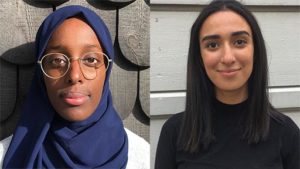The theme of this year's Human Rights Days was the right to a life free from violence. And that was exactly what was discussed at the seminar Agenda 2030 and security for women and children on the run. Women and children on the run are a group that is extremely exposed to both violence and insecurity. But increasing women's influence has proven to be a key to both security and lasting peace.
One of the panelists, Christina Hagner from Kvinna till Kvinna, said that the organization started during the Yugoslav war when the founders thought there was a lack of a gender perspective. The organization's goal is to give women the opportunity to take control of their own lives and participate in the fight for peace and human rights.
Kvinna till Kvinna collaborates with several women's organizations around the world, and during an interview after the seminar, Hagner says that they work hard to listen to the women and support their organizations. A major problem is that women's perspectives are not prioritized and that the local women's groups are not heard.
Hagner emphasizes the importance of not seeing women as victims, they know what is needed to improve their situation. Women are a marginalized group in war, but also in peace prevention work. In war, women are less able to protect themselves, this is because women are already a socially vulnerable group before wartime. And this is reinforced in connection with war.
There is an increase in violence and sexual exploitation of women and girls in conflicts. Despite the fact that women have pursued several peace movements and recovery work after conflicts, they are absent from political forums and peace negotiations. According to Hagner, this leads to a lack of a gender perspective, which reinforces inequality in society.
However, we must not forget that women at the local level make a huge difference in their work for peace. Women have the potential and ability to do a lot once they get the chance. But it is precisely in larger contexts that they are excluded because of discrimination but also because there may be threats of violence and sexual harassment against the women who organize. There, the women do not receive the support they need to be able to take their work from the local to the national level.
When we asked Hagner where her commitment to women's rights comes from, she says that she worked for a long time with a child rights perspective and began her commitment to Save the Children. She believes that if you work to strengthen women, you secure the children's safety and future as well. It is usually women who have the main responsibility for children and households. Strengthening women's social position in society also leads to increased security for children.
We discussed whether resolutions and the global goals in Agenda 2030 create real change for vulnerable and marginalized groups. Hagner believes that international resolutions are important as they set standards for how we work with these issues. They play a major role in the long-term work and it becomes easier for organizations to press with these resolutions and conventions as support.
After the seminar and the conversation with Hagner, we thought about how the empowerment of women can work as a bridge to a world where women and children are safe - even in insecure conditions such as conflicts. Hagner mentioned that it is women's organizations that have pushed for women's rights and for the right to security. Gender issues must be pursued at the highest level in order for that issue to be prioritized at all levels and in all issues. Gender equality must permeate the entire Agenda 2030.

